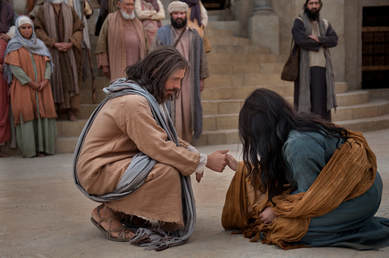 Photo by Cerys Lowe on Unsplash
Photo by Cerys Lowe on Unsplash
What is Compassion?
The word ‘compassion’ comes from two Latin words, ‘suffer’ and ‘with’. To show compassion means to suffer with someone, to enter into a person’s situation and become involved in that person’s suffering. Compassion is not a theoretical attitude, put a practical involvement. It involves doing, not just thinking or saying. ‘A compassionate response to suffering requires that one be moved by the suffering of the other, act to remove the immediate effects of the suffering, and respond at length to correct the structures which may have given rise to the suffering itself.’ (New Dictionary of Christian Ethics, ed. D. J. Atkinson & D. F. Field [Downers Grove, Illinois, InterVarsity Press], p. 244).
There are two aspects of compassion. They are emotion and action. The emotion of compassion, expresses a desire to relieve a person’s suffering. But that emotion must lead to action. Compassion is an act of will - a decision to become actively involved in alleviating that person’s suffering.
Jesus’ Compassion
Jesus’ whole life demonstrated compassion. He left His home having no place to lay His head;
Matthew 8:20 NIV Jesus replied, “Foxes have dens and birds have nests, but the Son of Man has no place to lay his head.”
He became the friend of the outcast;
Matthew 11:19 NIV The Son of Man came eating and drinking, and they say, ‘Here is a glutton and a drunkard, a friend of tax collectors and sinners.’ But wisdom is proved right by her deeds.”
He had compassion for all of the people who flocked to see, hear, and be healed of physical, mental, and emotional sickness and demonic possession.
Matthew 9:35-36 NIV Jesus went through all the towns and villages, teaching in their synagogues, proclaiming the good news of the kingdom and healing every disease and sickness. When he saw the crowds, he had compassion on them, because they were harassed and helpless, like sheep without a shepherd.
Even when He tried to get away to be by Himself after the execution of John the Baptist, the crowds follow Him. Seeing their desperation He has compassion on them, healed their sick and then fed them.
Matthew 14:13-21 NIV When Jesus heard what had happened, he withdrew by boat privately to a solitary place. Hearing of this, the crowds followed him on foot from the towns. When Jesus landed and saw a large crowd, he had compassion on them and healed their sick. As evening approached, the disciples came to him and said, “This is a remote place, and it’s already getting late. Send the crowds away, so they can go to the villages and buy themselves some food.” Jesus replied, “They do not need to go away. You give them something to eat.” “We have here only five loaves of bread and two fish,” they answered. “Bring them here to me,” he said. And he directed the people to sit down on the grass. Taking the five loaves and the two fish and looking up to heaven, he gave thanks and broke the loaves. Then he gave them to the disciples, and the disciples gave them to the people. They all ate and were satisfied, and the disciples picked up twelve basketfuls of broken pieces that were left over. The number of those who ate was about five thousand men, besides women and children.
He even disregarded His own safety when in His compassion He touched lepers and didn't forbid them from coming near him.
Mark 1:40-42 NIV A man with leprosy came to him and begged him on his knees, “If you are willing, you can make me clean.” Jesus was indignant. He reached out his hand and touched the man. “I am willing,” he said. “Be clean!” Immediately the leprosy left him and he was cleansed.
 Photo credit: The Woman Caught in Adultery - UQ Catholic Chaplaincy
Photo credit: The Woman Caught in Adultery - UQ Catholic Chaplaincy
Compassion for Sinners
Jesus’ compassion was not confined to cases of physical need or suffering. Let's take Jesus’ disciple, Matthew the writer of the Gospel that bears his name. Matthew was working as a tax collector, and hated by his fellow Jews. At a dinner party at his house where he invited Jesus along with others identified as sinners.
Matthew 9:9-11 NIV As Jesus went on from there, he saw a man named Matthew sitting at the tax collector’s booth. “Follow me,” he told him, and Matthew got up and followed him. While Jesus was having dinner at Matthew’s house, many tax collectors and sinners came and ate with him and his disciples. When the Pharisees saw this, they asked his disciples, “Why does your teacher eat with tax collectors and sinners?”
Jesus’ response to the Pharisees was one of compassion.
Matthew 9:12-13 NIV On hearing this, Jesus said, “It is not the healthy who need a doctor, but the sick. But go and learn what this means: ‘I desire mercy, not sacrifice.’ For I have not come to call the righteous, but sinners.”
Then there’s the time the Pharisees brought a woman actually caught in an adulterous act to Jesus to see how he would react. He responded with compassion not judgement.
John 8:9-11 NIV At this, those who heard began to go away one at a time, the older ones first, until only Jesus was left, with the woman still standing there. Jesus straightened up and asked her, “Woman, where are they? Has no one condemned you?” “No one, sir,” she said. “Then neither do I condemn you,” Jesus declared. “Go now and leave your life of sin.”
Jesus’ Statement Of Compassion
Luke 4:16-21 NIV He went to Nazareth, where he had been brought up, and on the Sabbath day he went into the synagogue, as was his custom. He stood up to read, and the scroll of the prophet Isaiah was handed to him. Unrolling it, he found the place where it is written: “The Spirit of the Lord is on me, because he has anointed me to proclaim good news to the poor. He has sent me to proclaim freedom for the prisoners and recovery of sight for the blind, to set the oppressed free, to proclaim the year of the Lord’s favor.” Then he rolled up the scroll, gave it back to the attendant and sat down. The eyes of everyone in the synagogue were fastened on him. He began by saying to them, “Today this scripture is fulfilled in your hearing.”
Jesus brought hope, where people had abandoned hope. He declared forgiveness, where people were tormented by guilt. He brought inner release, where people were oppressed by evil spirits. He brought healing, where there was sickness. He fed the hungry, where there was hunger. Compassion is concerned for people’s spiritual and social problems.
1 John 4:7-12 NIV Dear friends, let us love one another, for love comes from God. Everyone who loves has been born of God and knows God. Whoever does not love does not know God, because God is love. This is how God showed his love among us: He sent his one and only Son into the world that we might live through him. This is love: not that we loved God, but that he loved us and sent his Son as an atoning sacrifice for our sins. Dear friends, since God so loved us, we also ought to love one another. No one has ever seen God; but if we love one another, God lives in us and his love is made complete in us.
We are challenged by Jesus to be compassionate and merciful, as he was. What follows is an example of compassion that Jesus had for us and wants us to have for others. There is no evidence that the story is true but the message of compassion is crystal clear.
A Story Of Extraordinary Compassion
A nurse took the tired, anxious serviceman to the bedside. "Your son is here," she said to the old man.
She had to repeat the words several times before the patient's eyes opened. Heavily sedated because of the pain of his heart attack, he dimly saw the young uniformed Marine standing outside the oxygen tent. He reached out his hand. The Marine wrapped his toughened fingers around the old man's limp ones, squeezing a message of love and encouragement. The nurse brought a chair so that the Marine could sit beside the bed. All through the night, the young Marine sat there in the poorly lighted ward, holding the old man's hand and offering him words of love and strength.
Occasionally, the nurse suggested that the Marine move away and rest awhile. He refused. Whenever the nurse came into the ward, the Marine was oblivious of her and of the night noises of the hospital - the clanking of the oxygen tank, the laughter of the night staff members exchanging greetings, the cries and moans of the other patients. Now and then, she heard him say a few gentle words. The dying man said nothing, only held tightly to his son all through the night.
Along towards dawn, the old man died. The Marine released the now lifeless hand he had been holding and went to tell the nurse. While she did what she had to do, he waited. Finally, she returned. She started to offer words of sympathy, but the Marine interrupted her.
"Who was that man?" he asked.
The nurse was startled. "He was your father," she answered.
"No, he wasn't," the Marine replied. "I never saw him before in my life."
"Then why didn't you say something when I left you with him?"
"I knew right away there had been a mistake, but I also knew he needed his son, and his son just wasn't here. When I realized that he was too sick to tell whether or not I was his son, knowing how much he needed me, I stayed." (from Cybersalt Digest)]

 RSS Feed
RSS Feed